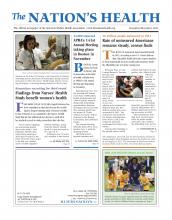Many seniors with memory loss don’t tell their doctor
Nearly 13 percent of Americans ages 60 and older report confusion or memory loss, but 80 percent of them have not talked about the symptoms with their doctors, according to a recent survey.
The data came from the Behavioral Risk Factor Surveillance System and “confirms the growing prevalence of cognitive decline and future implications of an aging America,” according to the Alzheimer’s Association. The findings also highlight the need for people to talk to their doctors about memory problems.
The survey found that one-third of those older Americans who reported worsening confusion or memory problems in the previous year said the decline interfered with their work, social activities or ability to do household chores. While no treatments can slow or stop Alzheimer’s disease, early detection is key for planning and providing for quality care.
The association urges people to be aware of the 10 warning signs of Alzheimer’s, available at www.alz.org/10signs.
Simple, rapid test for drug-resistant malaria developed
Scientists have developed a new and rapid way to test whether the most common and lethal form of malaria is resistant to medication.
A study published Sept. 10 in The Lancet Infectious Diseases highlighted results from testing the novel, in-vitro ring-stage survival assays to identify artemisinin-resistant malaria parasites in people with malaria. They found the test could detect the drug-resistant malaria strains in three hours or less. Currently, malaria’s drug susceptibility is monitored through a labor-intensive process of admitting patients to a hospital and measuring the time taken to clear parasites from their blood by counting parasites every six to eight hours for two or three days after treatment.
Researchers from Cambodia, Paris and the National Institutes of Health were involved in the study.
School-age drinking ups future breast cancer risk
The more alcohol women drink before motherhood, the higher their risk of future breast cancer, a recent study finds.
The study, published online Aug. 28 in the Journal of the National Cancer Institute, linked breast cancer risk to drinking between early adolescence and first full-term pregnancy.
“More and more heavy drinking is occurring on college campuses and during adolescence, and not enough people are considering future risk,” said study co-author Graham Colditz, MD, DrPH, associate director for prevention and control at Siteman Cancer Center at Barnes-Jewish Hospital and the Washington University School of Medicine.
The study found a 13 percent higher risk of breast cancer for women who average a drink per day between their first period and her first full-term pregnancy. The study also found that for every bottle of beer, glass of wine or shot of liquor consumed daily, a young woman increases her risk of benign breast disease by 15 percent.
Call for papers on disparities, physician advocacy
Two health-related journals are seeking papers on health topics.
The journal Research in the Sociology of Health Care is now seeking papers on macro- and micro-level issues involving technology, communications, disparities and government options associated with health and health care. The editors are looking for papers that zero in on linkages to policy, population concerns and providers of care as methods to meet the health care needs of U.S. residents as well as people in other countries.
The submission deadline is Feb. 3. Manuscripts and questions can be directed to Jennie Jacobs Kronenfeld, PhD, a professor at the School of Social and Family Dynamics at Arizona State University, at jennie.kronenfeld{at}asu.edu or 480-965-8053.
Virtual Mentor, the American Medical Association Journal of Ethics, is seeking submissions for a special issue titled “Beyond the Bedside: Physicians as Agents of Change.” Editors are particularly interested in papers exploring the philosophical and historical foundations of physician social activism; original research on physician efforts to address barriers to health in the United States; articles on creative activism-related curricula in schools of medicine and residency programs; and personal narratives of physicians and students, especially ones that involve action by patients and providers.
Manuscripts received before Dec. 13 will have the best chance for consideration. For more details on submission, visit http://virtualmentor.ama-assn.org/site/instructions.html.
- Copyright The Nation’s Health, American Public Health Association









